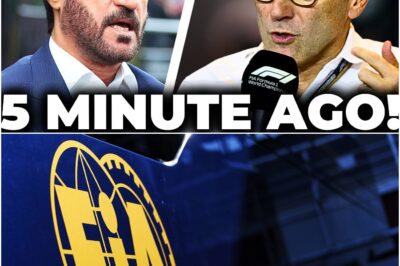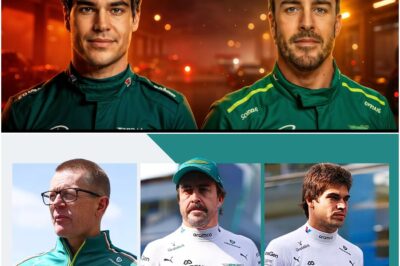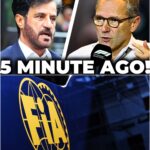In the passionate, often-heated debates that swirl around Formula 1, words like “greatest” and “legend” are thrown around with such frequency that they risk losing their meaning. Fans endlessly compare titans like Schumacher, Senna, Hamilton, and Prost, creating a Mount Rushmore of the sport’s most visible icons. In this same arena, the term “underrated” has become a common, almost fashionable, label. But it’s often misapplied, used to describe drivers who are anything but overlooked—men who are polarizing, certainly, but whose every move is analyzed and debated by millions. They are worshipped and criticized in equal measure, but they are never ignored.

But what if there was a true ghost in the machine? A figure whose monumental achievements and profound influence are so vast they are paradoxically hidden in plain sight? There is, and his name is Niki Lauda. He is perhaps the only multi-champion in history for whom the “underrated” label genuinely fits, not because he lacked success, but because the sheer breadth of his impact—as a driver, a survivor, a businessman, and a kingmaker—is rarely ever fully appreciated.
Lauda’s journey into the high-stakes world of Formula 1 was a testament to a singular, unyielding will. He didn’t come from racing royalty, nor was he immediately embraced by the motorsport establishment. Born into a wealthy Austrian family that disapproved of his racing ambitions, Lauda was cut off financially. In a move that perfectly encapsulated his pragmatic and daring character, he walked into a bank and took out a loan against his own life insurance policy to buy his way into the sport. It was a cold, calculated gamble on himself, a declaration that he was willing to risk everything, including his future, for a shot at the pinnacle of racing.
This analytical and unsentimental approach defined his driving style. While many of his contemporaries, like the flamboyant James Hunt, drove with raw instinct and flair, Lauda was a racing computer. He possessed an extraordinary ability to deconstruct a car’s performance, providing engineers with feedback that was not just precise but relentless. He understood the mechanics, the engineering, and the physics in a way few others did. This technical acumen caught the attention of the legendary Enzo Ferrari, who, despite initial skepticism, saw in Lauda the methodical mind needed to end a decade-long championship drought for the Scuderia. In 1975, Lauda delivered, bringing the driver’s title back to Maranello for the first time in 11 years.

By 1976, he was utterly dominant. But that season would become infamous for an event that would forever define his legacy. At the treacherous Nürburgring, the “Green Hell,” Lauda suffered a horrific, fiery crash. Trapped in the wreckage, he sustained severe burns to his head and, critically, inhaled toxic, superheated gases that scorched his lungs. A priest administered the last rites at his hospital bedside. For anyone else, it would have been the end—of a career, and nearly a life.
For Niki Lauda, it was an intermission.
In what remains one of the most courageous and frankly unbelievable comebacks in all of sporting history, Lauda returned to the cockpit just six weeks later at the Italian Grand Prix in Monza. With his wounds still raw and bandaged, he put on his helmet and qualified fifth. He finished the race in fourth place, earning crucial championship points. The physical pain must have been excruciating, but the mental fortitude required to face down his own mortality and race again at over 200 mph is almost incomprehensible.
That season’s title fight came down to the final race in a rain-soaked Japan. With visibility near zero, Lauda, the man who had just walked through fire, made a decision that spoke volumes about his character. He pulled into the pits and retired from the race, deeming the conditions too dangerous. He willingly surrendered the championship to his rival, James Hunt. Critics called it weakness; Lauda called it logic. His life was worth more than a title. This calculated act of self-preservation, made in the face of immense pressure, was not the act of a coward, but of a man who understood risk better than anyone. He would be back, on his own terms. And he was. The very next year, 1977, he calmly reclaimed his world championship with Ferrari.
After a brief retirement, he returned to the sport and achieved something no one else has, before or since. In 1984, driving for McLaren, he captured his third world title, beating his supremely talented teammate Alain Prost by a mere half-point—the slimmest margin in F1 history. With this victory, Lauda became the only driver ever to win a championship for both Ferrari and McLaren, the two most storied and successful teams in the sport’s history. It is a singular achievement that underscores his adaptability and his genius.

Yet, arguably, Lauda’s most profound impact on modern Formula 1 came long after he hung up his helmet for good. As non-executive chairman at Mercedes, he was the silent architect of the most dominant dynasty the sport has ever seen. In 2012, he was the crucial voice who convinced Lewis Hamilton to leave the comfort of McLaren and take a gamble on the then-midfield Mercedes team. It was Lauda’s credibility as a three-time champion and his clear, logical vision that persuaded Hamilton this was the path to greatness. That partnership would go on to shatter nearly every record in the book.
Within the Mercedes garage, Lauda was the indispensable stabilizing force. During the intense and often toxic rivalry between Hamilton and Nico Rosberg, it was Lauda who could walk into a room, command respect from both drivers, and cut through the tension with his blunt, no-nonsense authority. He wasn’t just a boss; he was a legend who had been there, done that, and survived far worse. His presence ensured the team’s focus remained on winning, not on internal politics. It is perhaps no coincidence that after his passing in 2019, many felt the team lost a certain edge, a guiding voice of reason, a loss felt most acutely in the controversial chaos of the 2021 Abu Dhabi finale.
Niki Lauda’s story is not a simple fairytale. He was pragmatic, often brutally direct, and cared little for public adoration. He was interested in results, not romance. Perhaps this is why his name is sometimes lost in the shuffle of “greatest ever” debates. He wasn’t the mystical Senna or the flamboyant Hunt. He was the computer, the survivor, the strategist. But his legacy is everywhere: in the safety standards born from his accident, in the records of Lewis Hamilton, in the dominance of the Mercedes dynasty, and in the unique, unrepeatable achievement of conquering F1’s two greatest empires. He is the ultimate underrated legend, a man whose greatness is not just measured in three championships, but in a lifetime of resilience, intelligence, and unparalleled influence.
News
Cracks in the Prancing Horse: The Shocking Internal Failures Behind Hamilton’s Ferrari Nightmare
The motorsport world held its collective breath when Lewis Hamilton, the seven-time world champion, announced his historic move to Scuderia…
Formula 1 on the Verge of a Revolution: Reverse Grids and More Sprints Could Redefine Racing Forever
The world of Formula 1, a pinnacle of motorsport where tradition and cutting-edge technology collide, is once again rumbling with…
Alonso’s Brilliance Isn’t Enough: Inside Aston Martin’s Turbulent 2025 Season of High Hopes and Harsh Realities
The air in the Aston Martin garage at the start of the 2025 Formula 1 season was thick with optimism….
McLaren’s Dream Season on the Brink of ‘Civil War’ as Norris and Piastri Rivalry Explodes
In the high-octane world of Formula 1, where speed is king and every thousandth of a second counts, the greatest…
The $5 Billion Power Play: Is Christian Horner About to Conquer Aston Martin and Reshape the F1 Grid Forever?
In the high-octane world of Formula 1, the drama off the track often rivals the action on it. Now, the…
From Dream to Drama: Is Lewis Hamilton’s Ferrari Fairytale Already Over?
The blockbuster move that sent shockwaves through the Formula 1 world now appears to be on shaky ground. Lewis Hamilton,…
End of content
No more pages to load












